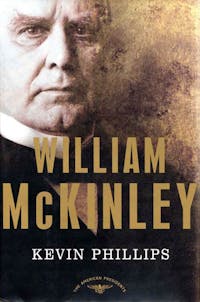William McKinley
The American Presidents Series: The 25th President, 1897-1901
 Download image
Download image
ISBN10: 0805069534
ISBN13: 9780805069532
Hardcover
208 Pages
$34.00
CA$46.00
William McKinley's election in 1896 was a breakthrough. It marked the first time in two decades that the Republican party was able to dominate American politics for a generation. Meanwhile, the presidency had been declining in prestige and power, and McKinley's election restored it to prominence.
In the century since his death, McKinley's accomplishments have been eclipsed by the charisma and public appeal of his vice president and successor, Theodore Roosevelt. But, as Kevin Phillips explains, McKinley was a major American president, deserving admission to the second tier, the capable performers below the lofty level of Washington, Lincoln, and FDR. He is among the sixteen U.S. presidents elected to two terms, and he avoided the tarnish of major scandal. It was during his administration that the United States made its diplomatic and military debut as a world power, partly through McKinley's shrewd prosecution of the Spanish-American War. McKinley is one of eight presidents who, either in the White House or on the battlefield, led the nation in successful wars; more important, he is among the six or seven whose election led to a major realignment of the U.S. party system.
Phillips, the author of Wealth and Democracy and The Cousins' Wars, has long been fascinated with McKinley and the Republican party's cycles of power. He explains that McKinley's lackluster ratings have been sustained not by unjust biographers, but by a legacy of unfair criticism about his personality, his indirect style of governing, his Victorian middle-class demeanor, and his inability to inspire the American public. In this powerful reexamination of McKinley's life and presidency, Phillips argues convincingly that McKinley's accomplishments qualify him for promotion into the ranks of the near-great chief executives.
Reviews
Praise for William McKinley
"William McKinley is one of our most underappreciated presidents, despite his belonging to the select and small company of American chief executives who accomplished a major party realignment, restored solid prosperity, presided over a successful war, and won election to two terms. He managed all of these things, and was upright and moral to boot. This book, quite simply, is to restore perspective and to help give a worthy and unfairly minimized presidency its due."—Kevin Phillips on William McKinley
"Within the constraints of a concise biography, Phillips deftly explores aspects of McKinley's character that undercut his business-friendly reputation and soften his stoic image."— Michael Kenney, The Boston Globe
"Mr. Phillips gives us a nuanced portrait of McKinley that allows him to emerge from behind the assassin's bullet and Roosevelt's shadow."—Gerald J. Russello, The New York Sun
"Wasn't William McKinley the lackluster chief executive whose assassination left the dynamic Teddy Roosevelt president? In this latest volume in the [Times Books] American Presidents series, historian Phillips, author of the well-received Cousins' Wars (1999), shows us there is much more to McKinley. In fact, the author goes so far as to insist, 'By any serious measurement, William McKinley was a major American president.' Of course, Phillips is not asking that the twenty-fifth president (whose tenure ran from 1897 to 1901) be considered a first-rank chief executive, alongside Washington and Lincoln. But in this original reevaluation, he makes a strong case for placing McKinley on the 'six- or eight-president second tier' . . . [He] convinces readers that McKinley was a healing, renewing, and reuniting leader—a near-great president, that is. A bold, new look that, itself, deserves a serious look."—Brad Hooper, Booklist
"An engaging life of the stoical Buckeye politician, whom Phillips (Wealth and Democracy, 2002, etc.) reckons to be 'an upright and effective president of the solid second rank.' Faint praise, perhaps. But
cf0considering other second-rank presidents from the middle class (Nixon, Reagan, Clinton), and even considering some of the first tier, William McKinley looks better and better as the years roll on. As Phillips—an eminent political historian and biographer, and one of the best in the business—points out, McKinley was a 'hinge president,' whose first term ushered in the 20th century, and who 'presided over the fruition of the Northern or Yankee version of U.S. expansionism, a commercial manifest destiny tied to increasing American exports.' Which sounds rather like the current rush to globalism, and, as Phillips observes, latter GOP operative Karl Rove has lately taken to pointing to McKinley's 'realignment' of the Republican party toward progressivism and free trade as a model for his modern counterparts—while, as Phillips also adds, carefully ignoring the fact that McKinley believed in laying the tax burdens squarely on the rich, embraced organized labor, used American military force (against Spain, in his time) only reluctantly, and rejected 'the national party influence and patronage demands of the Eastern state GOP machine leaders.' Phillips, who clearly and understandably admires McKinley, charts his rise from a staff officer during the Civil War (during which his habits of careful study and preparation served his senior officers well) to local-level politician to well-liked national figure—and finally to martyr, McKinley having been assassinated in 1901 by what his official biography calls 'a deranged anarchist.' In all his roles, Phillips observes, McKinley labored earnestly to achieve consensus, arriving at a moderate platform that his vice president and successor, Theodore Roosevelt, carried on, and so effectively that Phillips views the two presidencies as a single continuum. An instructive, graceful look at a neglected presidency."—Kirkus Reviews
Reviews from Goodreads
BOOK EXCERPTS
Read an Excerpt
Listen to an Excerpt from the Audiobook
Download MP3MEDIA
Watch
William McKinley by Kevin Phillips--Audiobook Excerpt
Listen to this audiobook excerpt from Kevin Phillips' biography William McKinley. By any serious measurement, bestselling historian Kevin Phillips argues, William McKinley was a major American president. It was during his administration that the United States made its diplomatic and military debut as a world power.
Share This


